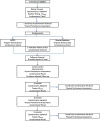The role of exercise in modifying outcomes for people with multiple sclerosis: a randomized trial
- PMID: 23809312
- PMCID: PMC3706216
- DOI: 10.1186/1471-2377-13-69
The role of exercise in modifying outcomes for people with multiple sclerosis: a randomized trial
Abstract
Background: Despite the commonly known benefits of exercise and physical activity evidence shows that persons Multiple Sclerosis (MS) are relatively inactive yet physical activity may be even more important in a population facing functional deterioration. No exercise is effective if it is not done and people with MS face unique barriers to exercise engagement which need to be overcome. We have developed and pilot tested a Multiple Sclerosis Tailored Exercise Program (MSTEP) and it is ready to be tested against general guidelines for superiority and ultimately for its impact on MS relevant outcomes. The primary research question is to what extent does an MS Tailored Exercise Program (MSTEP) result in greater improvements in exercise capacity and related outcomes over a one year period in comparison to a program based on general guidelines for exercise among people with MS who are sedentary and wish to engage in exercise as part of MS self-management.
Methods/design: The proposed study is an assessor-blind, parallel-group, randomized controlled trial (RCT). The duration of the intervention will be one year with follow-up to year two. The targeted outcomes are exercise capacity, functional ambulation, strength, and components of quality of life including frequency and intensity of fatigue symptoms, mood, global physical function, health perception, and objective measures of activity level. Logistic regression will be used to test the main hypothesis related to the superiority of the MSTEP program based on a greater proportion of people making a clinically relevant gain in exercise capacity at 1 year and at 2 years, using an intention-to-treat approach. Sample size will be 240 (120 per group).
Discussion: The MS community is clearly looking for interventions to help alleviate the disabling sequelae of MS and promote health. Exercise is a well-known intervention which has known benefits to all, yet few exercise regularly. For people with MS, the role of exercise in MS management needs to be rigorously assessed to inform people as to how best to use exercise to reduce disability and promote health.
Trial registration: Clinical Trials.gov: NCT01611987.
Figures
Similar articles
-
Participation in and outcomes from a 12-month tailored exercise programme for people with multiple sclerosis (MSTEP©): a randomized trial.Clin Rehabil. 2020 Jul;34(7):927-937. doi: 10.1177/0269215520923089. Epub 2020 May 21. Clin Rehabil. 2020. PMID: 32438828 Clinical Trial.
-
Randomized controlled trial of a teleconference fatigue management plus physical activity intervention in adults with multiple sclerosis: rationale and research protocol.BMC Neurol. 2012 Oct 16;12:122. doi: 10.1186/1471-2377-12-122. BMC Neurol. 2012. PMID: 23072517 Free PMC article. Clinical Trial.
-
Effect of exercising at minimum recommendations of the multiple sclerosis exercise guideline combined with structured education or attention control education - secondary results of the step it up randomised controlled trial.BMC Neurol. 2017 Jun 24;17(1):119. doi: 10.1186/s12883-017-0898-y. BMC Neurol. 2017. PMID: 28646860 Free PMC article. Clinical Trial.
-
Interventions for preventing falls in people with multiple sclerosis.Cochrane Database Syst Rev. 2019 Nov 28;11(11):CD012475. doi: 10.1002/14651858.CD012475.pub2. Cochrane Database Syst Rev. 2019. PMID: 31778221 Free PMC article.
-
Behavioural modification interventions for medically unexplained symptoms in primary care: systematic reviews and economic evaluation.Health Technol Assess. 2020 Sep;24(46):1-490. doi: 10.3310/hta24460. Health Technol Assess. 2020. PMID: 32975190 Free PMC article.
Cited by
-
The Effect of Continuous Care on the Lifestyle of Patients with Multiple Sclerosis: A Randomized Clinical Trial.Iran J Nurs Midwifery Res. 2017 May-Jun;22(3):225-231. doi: 10.4103/1735-9066.208170. Iran J Nurs Midwifery Res. 2017. PMID: 28706548 Free PMC article.
-
Mindfulness-based interventions in multiple sclerosis: beneficial effects of Tai Chi on balance, coordination, fatigue and depression.BMC Neurol. 2014 Aug 23;14:165. doi: 10.1186/s12883-014-0165-4. BMC Neurol. 2014. PMID: 25145392 Free PMC article. Clinical Trial.
-
Clinically Assessed Walking Capacity Versus Real-World Walking Performance in People with Multiple Sclerosis.Int J MS Care. 2020 May-Jun;22(3):143-150. doi: 10.7224/1537-2073.2019-047. Epub 2020 Jun 15. Int J MS Care. 2020. PMID: 32607077 Free PMC article.
-
Quality improvement in neurology: Multiple sclerosis quality measures: Executive summary.Neurology. 2015 Nov 24;85(21):1904-8. doi: 10.1212/WNL.0000000000001965. Epub 2015 Sep 2. Neurology. 2015. PMID: 26333795 Free PMC article. Review. No abstract available.
-
Developing a Valuation Function for the Preference-Based Multiple Sclerosis Index: Comparison of Standard Gamble and Rating Scale.PLoS One. 2016 Apr 28;11(4):e0151905. doi: 10.1371/journal.pone.0151905. eCollection 2016. PLoS One. 2016. PMID: 27123850 Free PMC article.
References
-
- Warren S, Warren KG. Prevalence of multiple sclerosis in Barrhead county, Alberta, Canada. Can J Neurol Sci. 1992;19:72–75. - PubMed
-
- Warren S, Svenson LW, Warren KG, Metz LM, Patten SB, Schopflocher DP. Incidence of multiple sclerosis among First Nations people in Alberta, Canada. Neuroepidemiology. 2007;29:21–27. - PubMed
Publication types
MeSH terms
Associated data
LinkOut - more resources
Full Text Sources
Other Literature Sources
Medical


